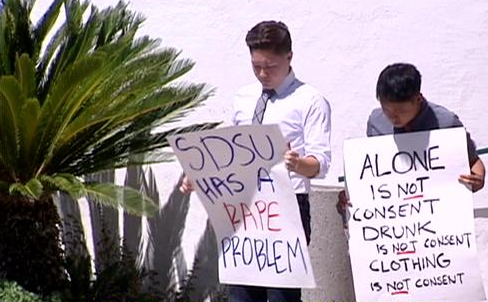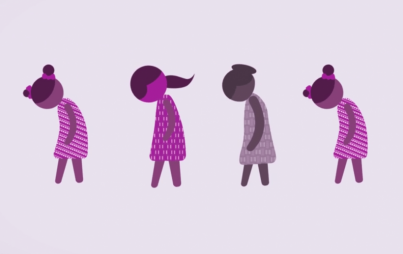
Sometimes you've got to savor small victories. Especially on a grey, malaise-inducing Wednesday when the world feel like it's both unravelling and rotting from the inside out.
About two weeks ago, San Diego State University's Greek Life authorities announced they were suspending all Greek life in the wake of fraternity members harassing protesters at a Take Back The Night protest on campus, waving sex toys and hurling eggs. This taking place with the horrifying backdrop of 14 reported rapes since the beginning of the semester—not even including one incidence of sexual assault which occurred a mere 24 hours after the march—and no arrests. No nothing.
Until yesterday. Following yet another protest headed up by the SDSU chapter of Take Back The Night, SDSU sophomore Francisco Paiva Sousa, 20, was taken into custody around 2 PM, charged with forcible oral copulation and false imprisonment.
While a small slice of justice does a body good, members of SDSU's Take Back The Night have partnered with a huge host of organizations and issued a lengthy list of demands aimed at fundamentally shifting what they believe is the dangerously pervasive presence of—and apathy towards—sexual violence on campus.
(Take Back The Campus endorsers include:
- University of California, Berkeley: Sofie Karasek, Cofounder, End Rape on Campus; Meghan Warner, Director, ASUC Sexual Assault Commission
- University of California, Santa Barbara: Alejandra Melgoza, On campus Coordinator, Take Back The Night UCSB
- San Diego State University: Jordan Busse, Co Organizer, Concerned Students of SDSU; Jessica Valencia, President, Andrea O’Donnell Women’s Outreach Association.)
The students have openly criticized SDSU's administration for blatantly overlooking crimes and fostering a flippant attitude towards sexual assault, particularly in regards to Greek life. The prevalence of sexual violence coupled with what feels like indifference from the very powers that are supposed to protect the student body at SDSU, in turn feels like a microcosm of collegiate life in America.
Here's a brief lowdown and discussion of their requests—you can read the entire statement here:
1. SDSU President Elliot Hirshman must answer community concerns about sexism and sexual violence at an open forum at the beginning of the Spring 2015 semester.
"He has made no attempt himself or through an intermediary, as far as we know, to meet with or speak to the survivor-activists who were harassed and intimidated at the Take Back The Night march on 11/21. His only public statement on the matter was a congratulation of the fraternity system of which he and his son are themselves a part. This is unacceptable for someone in his position who claims to be 'committed to ending sexual assault' on his campus."
2. AS (Associated Students) President Jonathan Cole and all other members of Delta Sigma Phi and Sigma Phi Epsilon must step down from AS positions. All members of AS should participate in education about sexism and sexual violence. Interfraternity Council President Marc Hess should also step down.
A study by John Foubert, author of The Men's and Women's Programs: Ending Rape Through Peer Education and founder of One in Four—a public nonprofit rape prevention organization—has shown that fraternity members are three times more likely to commit rape, and that fraternity membership has a negative impact on male behavior:
"Our study confirmed that fraternities provide the culture of male peer support for violence against women that permits bad attitudes to become treacherous behavior. And that should concern everyone. We need more action.
There are a lot of us across the country who have worked for decades trying to prevent rape on college campuses. Many experience high levels of frustration at the lack of commitment on the part of colleges and universities to face the issue. Rarely does a college discuss sexual assault with its students for more than 60 minutes in an entire college career, if they do at all."
The students' demand-list also points to the fact that members of SDSU's Sigma Phi Epsilon—the fraternity who tormented the protestors in late November—continue to remain hostile:

Jonathan Cole—an additional member of Sigma Phi Epsilon and President of Associated Students—is also being taken to task for his relative silence and reluctance to fully address the growing animosity within the community. "The students find it unacceptable that a member of this fraternity, which has harassed and intimidated students and is under investigation, has a position in which he is supposed to represent the student body." They urge the university to acknowledge that these events are not happening within an unfortunate vaccum or exist as an anomaly, but rather are part and parcel of lengthy—and complicated—sociocultural history.
"Members of AS should understand how sexism and historical inequalities have created a culture that stigmatizes sexual assault survivors. College campuses have been at the forefront in struggles against societal inequalities, and with that in mind we believe that all members of AS should participate regularly in education about sexism and sexual violence."
3. SDSU Police must stop victim-blaming messaging and racial profiling.
Capt. of SDSU police, Joshua Mays, has been accused of perpetuating "damaging myths about sexual assault," encouraging women to, “Be aware of your surroundings, avoid dimly lit locations, avoid alcohol consumption to the point of impairment,” rather than encouraging men, to, you know, not act in a sexually predatory manner. To make matters worse, it seems that in addition to being "incapable" of arresting one of the fourteen rapists still wandering around campus, they've also systemically targeted black men, issuing crime alerts that are laughably vague and racially targeted: “Suspect #4: African American male. No Further Details.”
"As anti-rape activists, we have a responsibility also to fight racial profiling, as “protection” of white women from Black men has historically been used as a justification for legal and extralegal violence against Black men, and the reality of the related history of rape of Black women by white men has been silenced . . .
We question SDSU PD’s impact on campus safety, and find its flaws to be part of a pattern endemic to policing, from SDPD’s history of sexual violence and harassment, to the origins of the “Slutwalk” movement in reaction to a police officer’s comment that female college students should “avoid dressing like sluts” to avoid being victimized, to the epidemic of police killings of people of color rightly outraging the entire country."
4. SDSU must heed Dr. Huma Ghosh’s recommendations for the Women’s Resource Center and Director and give continuous and ongoing support to programs underway:
a. Women’s Resource Center/Director
"We believe that the Women’s Center should not be under the Department of Student Life and Leadership, as this department is geared towards social activities. This Center needs to function first and foremost as a Rape Crisis and Resource Center, not a social space. Because of its level of importance and need for particular standing, the Women’s Resource Center should be it’s own department . . ."
b. Student initiated programs and Sexual Violence Task Force
"Students from WOA requested that this receive funding at the beginning of the semester through Student Success Fee Proposals and it was denied...We would like to point out that the College of Engineering received $121,096 in funding this semester and the College of Arts and Letters (to which Women’s Studies belongs) only received $5,000."
5. SDSU must institute Gender/Sexuality Studies class as a part of the General Education graduation requirements.
"The histories of oppressed populations, such as those covered in Women’s Studies, are missing from core GE classes and are often only available to students later in their college career as a “cultural competency requirement.” This type of education needs to start early and be ongoing."
It's all too easy to relegate these seemingly very specific SDSU stories to the sphere of anomaly—it's "just one university," or "just one man"—but by attempting to mitigate these cases of assault, we perpetuate the very problem at hand. To diminish one rape is to diminish them all.






